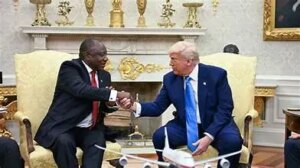The Silent Struggle: Understanding the Crisis of White Farmers in South Africa
In the realm of international discourse, few topics are as polarizing as the ongoing crisis facing white farmers in South Africa. Recently, the situation gained renewed attention when former President Donald Trump presented South African President Cyril Ramaphosa with alarming evidence of what some are calling a "white farmer genocide." Despite being a voice of warning during his first term, Trump’s claims have largely been met with dismissal by both the South African government and mainstream media.
A Shocking Presentation
In a compelling display at the White House, Trump played a video for Ramaphosa, showcasing troubling evidence that many wish to ignore. One particularly jarring moment featured Julius Malema, leader of the Economic Freedom Fighters (EFF), leading a crowd of 90,000 in a chant advocating violence against white farmers: “Kill the Boer, kill the white farmer.” This chant, shockingly deemed permissible by South Africa’s human rights court, raises questions about the country’s commitment to human rights and racial equality.
The political implications are stark. While the EFF is not the ruling party, its influence and rhetoric have resonated widely, stirring up tensions within the nation. Ramaphosa’s lack of condemnation after such incendiary events further showcases a reluctance to acknowledge the serious nature of this violence.
Historical Context: Policies and Their Backlash
To understand the current climate, one must look back to the policies enacted post-apartheid. The African National Congress (ANC), under Nelson Mandela, initiated programs like Black Economic Empowerment (BEE) that aimed to rectify historical injustices. However, critics argue that these policies have devolved into racially biased actions leading to significant economic turmoil and social division.
As noted by South African commentator Andrew Kenny, the changes wrought by the ANC have led to a drastic decline in infrastructure and services that once made South Africa a dynamic economy. The stark reality is that many white citizens have fled the country, fueled by fear for their safety and loss of livelihood. Economic despair has become a grim backdrop for the ongoing violence, with the World Bank estimating that high unemployment affects roughly 42% of the population.
The Unreported Reality: Violence Against White Farmers
Reports from various sources, including Newsweek, indicate that a white farmer is murdered every five days in South Africa. Despite this alarming statistic, the government has remained largely silent, failing to acknowledge the severity and racial motivations behind these attacks. The lack of media coverage and governmental response has created a climate where fear and frustration abound among affected communities.
Trump’s response to this situation included the unprecedented step of cutting financial aid to South Africa. This decision stemmed not only from the violence against farmers but also from the nation’s support of groups like Hamas and Iran, which casts doubt on its commitment to democratic values.
The Debate Over Human Rights
One of the most troubling aspects of this situation is the response— or lack thereof— from human rights advocates. The outcry against Trump’s claims has often overshadowed the very real narratives of violence and oppression faced by white farmers. Critics argue that this selective outrage undermines genuine discussions surrounding racial equality and human dignity.
Looking Forward: The Future of U.S.-South Africa Relations
Despite the turbulence surrounding them, Ramaphosa remains optimistic about future relations, expressing eagerness to negotiate a minerals deal with the United States. Given that the U.S. is South Africa’s second-largest trade partner, the stakes are high. Yet, a comprehensive solution to ensure the safety and rights of all citizens, particularly marginalized groups, remains elusive.
As discussions on human rights continue, it’s crucial to acknowledge the complex realities facing South Africa today. The narrative of white farmers and their challenges should not be brushed aside but rather integrated into broader conversations about justice, equity, and accountability.
At Extreme Investor Network, we believe that understanding the intersection of economics, politics, and social justice is critical not only for investing wisely but also for fostering global awareness and compassion. The situation in South Africa serves as a reminder that economic policies have profound human consequences—one that we cannot afford to ignore.

